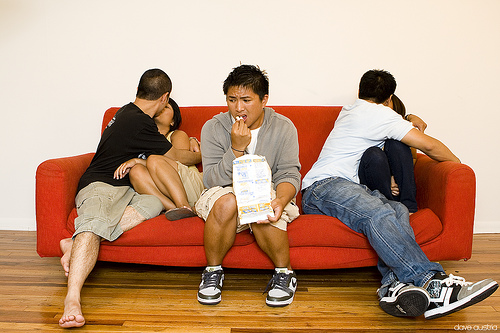There are a lot of emails in my Inbox from people who want to improve their social interactions. Many times, they’ll talk about coming across as creepy, or weird, and wanting real bad to fix this.
Sometimes this creepiness is mostly imaginary, many times though there is reliable evidence to support it, and sometimes others have told them point blank: “You’re creepy!” So I thought I’d share some insights about what can make someone come across as creepy and how to avoid it, based on my experience as a communication coach.
What Does Being Creepy Mean Anyway?
First of all, let’s get clear on what being creepy means exactly.
If you go to a reputable dictionary such as Merriam-Webster, you’ll find the term “creepy” defined as: “strange or scary, causing people to feel nervous and afraid”.
Put another way, when others say you’re creepy, it means you make them feel uncomfortable. Creepiness has to do with a feeling of unease triggered in others.
This brings me to a major point I wanna emphasize, which I believe is crucial to grasp:
There Are Only Creepy Actions, Not Creepy People
There is no such thing as a creepy person. Because, considering what being creepy means, a creepy person would be someone who makes nearly all people feel uncomfortable, nearly all the time. And pretty much nobody does that. Not even the crazy homeless people you may run into on the streets sometimes.
What we’re really talking about is behavior that makes some people feel uncomfortable. Sometimes you may say something or do something in a social setting that’s perceived by some as inappropriate, and it triggers discomfort in them. But that’s just a creepy action; it doesn’t mean you’re a creepy person overall. And even actions that seem creepy to some will often seem perfectly normal to others. Preferences play a big role.
Of course, people may call you creepy, but it doesn’t mean you are creepy. It just means you did or said something that came across to them as weird. Most people are really bad at properly labeling behavior though, and so they label individuals as a whole. Thus, they call you creepy, instead of your particular behavior.
So even though others may label you as creepy, don’t ever think of yourself that way. It’s a toxic and unrealistic way to see yourself. There is no such thing as a creepy person; there are just behaviors that come across as creepy, to some.
Now, let’s look at how you can get rid of such behaviors.
Be Consistent In Your Behavior
 When I talk with clients in coaching sessions about social situations where something they said or done came across as creepy, I frequently discover that it was because their behavior was inconsistent.
When I talk with clients in coaching sessions about social situations where something they said or done came across as creepy, I frequently discover that it was because their behavior was inconsistent.
They didn’t do something bad; they just shifted their conduct abruptly from one direction to another, which typically makes others uncomfortable.
For example, when a guy spends months interacting with a girl pretending to be just friends, and then one day suddenly comes out of the closet confessing he has a crush on her, that there is inconsistent behavior. He made a sudden shift from positioning himself as a friend to positioning himself as a lover. That will take most girls by surprise, they won’t know how to react, and thus it will make them feel uncomfortable. So it will seem creepy.
These kinds of situations arise because we act fake and hide our true intentions, and then at one point, voluntarily or not, we suddenly reveal our true intentions. That’s why I always encourage people to be genuine and not have hidden agendas. It will make their behavior unitary and reliable, and others will be able to trust them.
If you like someone, don’t hide it from them. Flirt with them; let them know how you feel. Hidden agendas create inconsistent behavior, and that will regularly be perceived as creepy.
Strip Yourself of Your Social Anxieties
One major reason why some people often come off as creepy is their social insecurities.
If you’re in a social situation and you feel anxious, it will affect your entire behavior and vibe. Anxious people often talk incoherently, there are awkward silences in their conversations, their gestures tend to be jerky, and their conduct clumsy. That will make others feel discomfort, and therefore they will seem creepy.
If you often feel anxious in social situations, I can promise that overcoming your social anxieties will be the single most important change you can make to not be perceived as creepy.
Over the past 6+ years, coaching shy and socially insecure individuals, I’ve found that social anxiety can be eliminated, by making some strategic changes in your thinking patterns, your self-image and your beliefs system.
This is a broad topic though, so I’m not gonna go into details here. However, I’ve created a special instructional presentation, in which I explain step-by-step how you can overcome your insecurities and gain rock-solid social confidence. Go here to access it and make sure you watch it.
Improve Your Social Awareness
Social awareness is the ability to understand how social situations work and what outcome what behavior will likely generate in such a situation. It’s what allows you to properly adjust your social behavior and create the impression you want.
In general, people who are often labeled as creepy lack social awareness. They are sort of clueless about what to do when they interact with others, which is why they behave awkwardly.
The good news is that social awareness can be developed. I’ve actually seen people with very low social awareness become highly socially savvy.
Primarily, it’s a matter of practice. You need to get out there and interact with people. You’ll make your fair share of mistakes at first, but if you reflect on them a bit and you learn from them, you’ll gain social awareness and you’ll become smooth with people.
Improving your social awareness is also a matter of learning about social dynamics from books, courses, and other people. This is the kind of stuff you rarely learn is school, but there are a lot of other quality sources of information out there.
With this in mind, I recommend you to join my free social success newsletter, which is where I share most of my advice for developing social skills and social confidence. I’m sure you’ll benefit a lot from it. Go to this page and enter your email to get onboard.
With more consistent behavior, less insecurities and more social awareness, you’ll get radically better reactions from other people. They’ll be more interested in talking to you, you’ll be invited to more social events, and you’ll appear charismatic instead of creepy.
Bear in mind though that it’s impossible to never do or say anything that comes off as creepy. Even the most socially skilled individuals seem creepy to some people, sometimes. It’s unavoidable. And it’s not a problem anyway.
As long as coming off creepy doesn’t happen a lot and it doesn’t prevent you from having a great social life, you’re fine. Go out there and be social.
 6. The lack of meaningful connections with others. Since they struggle with making conversation, feeling at ease around others and expressing themselves effectively, socially awkward people typically lack strong connections with others.
6. The lack of meaningful connections with others. Since they struggle with making conversation, feeling at ease around others and expressing themselves effectively, socially awkward people typically lack strong connections with others.